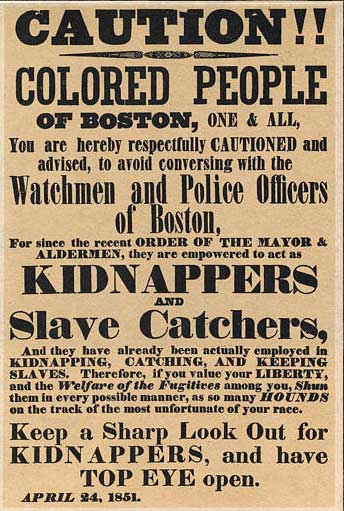
A poster from the time
The implementation of the Compromise of 1850 further radicalized the conflict over slavery. The Constitution had ensured the rights of slave holders to retrieve their slaves. It did not, however, provide a mechanism for doing so. The Fugitive Slave Act called for special commissioners to determine whether slaves were fugitives. There was no right to appeal, and federal marshals were forced to help in the recapture of the slaves. Northern abolitionists were appalled by the enforcement of the law. In many cases, Northern abolitionists forcibly obstructed the return of slaves. Many of those arrested had been living in the North for many years. Throughout the 1850's, 322 slaves were returned to the South.
On September 18, 1850 President Filmore signed the Fugitive Slave Act. Eight days later a man appeared in New York from Baltimore with a power of attorney, claiming that James Hamlet was a slave of Mrs Brown. The New York Commissioner immediately complied. The slave was transported back to Baltimore. Eight hundred dollars were raised by antislavery forces to buy James Hamlet’s freedom.
On December 31st three men appeared at the house of Joseph Miller in Pennsylvania and kidnapped Rachel Parker claiming she was an escaped slave. A group of eighth immediately organized to pursue them. They arrived in Baltimore to the public slave pen and protested the Rachel Parker was a free born Pennsylvanian. Authorities in Baltimore ordered that she be held for trail and fourteen months later she was freed.
In February Frederick Jenkins was found in Boston serving as a waiter by his former owners agent. He was arrested and thanks to legal intervention he was held over for trail. He was detained at the Federal Court House. A crowd came together and freed the former slave. He was quickly spirited out of Boston to Canada. In April 1851 Thomas Sims was found in Boston and arrested on a bogus charge of theft. This time the federal building was guarded by a four foot chain fence. Sims was eventually carried back to Georgia.
In September 1851 Edward Gorush a Marylander and his son arrived at Christiana in Lancaster County, Pennsylvania. There were a number of slaves in a home there. Gorush and US officials went to the home and demanded the surrender of the fugitives. Shots broke out and in the ensuing fight Gorush was killed and his son wounded. Quaker bystanders refused to help the Marshalls and were tried for treason, they were acquitted and the former slaves escaped.
 >
>